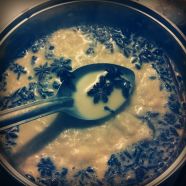A “Good Night” in Miami
To the untrained eye, Citrus aurantium resembles an ordinary orange that has seen better days. Maybe it has been long forgotten in a crisper drawer or abandoned in a fruit basket during a vacation. What should be a smooth yellowish peel is mottled with black spots and pitted with crevices. The fruit itself is shrunken and dried-out looking. But in the days before Christmas Eve, citrus aurantium or bitter orange (naranja agria) is a scarce commodity in Miami. Its juice forms the base of the marinade needed for the traditional Christmas Eve pig roast, the main event of Noche Buena.
A Christmas Eve party, Noche Buena is also an amalgam of the foods, music, and traditions of (Christian) Cuban diasporic life in Miami. The pig is roasted in a special charcoal-lined box invented in Havana’s Chinatown, and served with yuca, beans, and plantains that have been the staples of Cuban cooking since the colonial era. The celebrations’ traditions encompass much of the ethnic diversity of the island: Chinese laborers, enslaved people from Western Africa, and Spanish colonial settlers. It is at its core a celebration of a culture that many have long been exiled from and, more importantly, a gathering of family in a community where displaced and separated families are commonplace.
During my childhood, finding enough of the sad, shriveled bitter oranges to douse a pig was the first of a number of herculean tasks that signaled the arrival of Noche Buena and the Christmas holidays. Around December 21st, my mother would begin the journey from one grocery store to another, my brother and I in tow, to assess the produce department’s offerings with disgust. “No! They don’t have them. Let’s go to Sedano’s. And these plantains aren’t even green!” Packed back into her Suzuki station wagon before we could even avail ourselves of the candy aisle, we would hurtle to the next strip mall, over and over until the oranges were secured.
I am one of the first generation of my family born in the United States, and my Noche Buena had a distinctly assimilated flavor. Seeking the American dream in the suburbs developed at the edge of the Everglades, my parents moved to the western fringe of Miami to raise their own family. Noche Buena was the night my cousins and I would run amok in manicured backyards only a decade removed from swamp. The grown-ups monitored the pig roast, the yuca, and the black beans. We rolled our eyes at our uncles’ endless political debates and complained to one another about the uncomfortable holiday-themed outfits our mothers insisted on dressing us in, despite the year-round tropical weather.
For my grandparents and my parents enduring the adjustment to life in the United States in the early 1960s, Noche Buena was bittersweet. On the one hand, it was a rare joyful evening of dancing and drinking coquito, but in those early days of exile, any gathering was an excuse to discuss the inevitable return to Cuba, and the conversations often turned somber. Celia Cruz on the record player, the volume high to muffle their conversations, my grandparents and their friends discussed the new families arriving to the neighborhood, those still trying to leave, and shared letters from the unlucky few incarcerated on the island. Money was scant, ingredients for Cuban dishes were hard to find, and their cramped Little Havana apartments and Westchester bungalows left little room for large family gatherings. Nonetheless, these gatherings of this first generation of exiles kept a little flicker of their lives in Cuba alight. The rumors and endlessly rehashed developments in US-Cuba relations fed their hope and made facing the difficulties of el exilio for another year almost bearable.
Today, Noche Buena has become as much a holiday in Miami as any other. On December 24th, you can smell pigs roasting and hear blaring music on almost every block. Publix and Winn-Dixie supermarkets stock naranja agria, yuca, and even a few cajas chinas. Illegal fireworks brought over state lines from Georgia offer a new and distinctly Floridian tradition to the celebration. But I now live far from the Cuban enclave I was raised in, and it’s been a few years since I’ve been to a Noche Buena party. My cousins have also scattered far and wide, and nobody has taken up the mantle of hosting the party, hog and all. One thing about my Noche Buena hasn’t changed: my mother still complains that no grocery store in Miami stocks enough bitter oranges.







